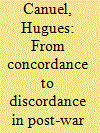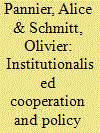|
|
|
Sort Order |
|
|
|
Items / Page
|
|
|
|
|
|
|
| Srl | Item |
| 1 |
ID:
128243


|
|
|
|
|
| Publication |
2013.
|
| Summary/Abstract |
It was a remarkable sight, on this sunny day of 26 August 1944: the patrician figure of Charles de Gaulle leading the victory parade down the Champs-Élysées following the evacuation of the French capital by the German occupier.1 The triumphal march under the acclaims of the Paris citizenry was symbolic of the dominant position the general had assumed in the Gouvernement provisoire de la République française. As provisional head of state and the dominant military figure in France, he was in a position of unprecedented power for a French army officer, at least since Napoleon Bonaparte had proclaimed himself First Consul in 1799. De Gaulle indeed held near-dictatorial powers as he set about rebuilding France at home and restoring control over her colonial empire. Nevertheless, he would resign less than two years later when faced with fierce opposition by established political figures disagreeing with his proposed constitution for a new republic.
Thus created in 1946 through the peaceful transfer of power from a quasi military supremo to a legitimately elected government, only to come to an ignominious end in 1958 under the threat of a military coup during the darkest days of the Algerian War of Independence, the short-lived French Fourth Republic experienced the full spectrum of civil-military relations (CMR). This episode provides a dramatic test case to measure the validity of any given CMR theory as it encompassed such a wide range of well-documented events focused on the very essence of the problematic, explaining civil society's relationship with the military organization established to protect it.2 One such theory seeks to measure a fundamental element of that equation, trying to answer the challenging question of '[w]hy will a military intervene in its own nation's system of government' by outlining the 'conditions [that] promote or inhibit domestic military intervention'.3 Scholar Rebecca Schiff proposed such a model nearly two decades ago, seeking to alleviate the alleged shortcomings of more established theories largely derived from the experience of the United States and often limited to arguments concerned with the separation of civil and military institutions.4
She posited instead that her theory of concordance 'considers the unique historical and cultural experiences of nations' and 'moves beyond institutional analysis by addressing issues relevant to a nation's culture'.5 This paper seeks to measure the validity of such a premise through the study of civil-military relations under the French Fourth Republic. This approach will require the reader initially to understand the evolution of CMR in France through the trauma of military defeat in 1940 and the rise of de Gaulle as well as the circumstances that led to the instauration of the Fourth Republic. It will then become necessary to evaluate the influence of successive challenges overseas, first in Indochina and then in Algeria, to establish the legitimacy of the concordance theory as civil-military relations came to a nadir in France. First, though, one must clearly comprehend the foundations of Schiff's theory in order to adequately judge its validity through the proposed case study.
|
|
|
|
|
|
|
|
|
|
|
|
|
|
|
|
| 2 |
ID:
131629


|
|
|
|
|
| Publication |
2014.
|
| Summary/Abstract |
What are the prospects for trilateral concord among Britain, France and Germany in terms of defence policies? Would more institutionalised links among them lead to more convergence of their defence policies? To answer these interrogations, this article investigates the relation between policy convergence and institutionalised cooperation, in particular by studying whether and when one is a prerequisite to the other. First, this article examines the extent to which these countries' defence policies have converged since the end of the cold war based on several indicators: their attitudes towards international forums, their defence budgets, the structure of their armed forces and their willingness to use force. Second, we study each of the bilateral relations between the three states to qualitatively analyse their degree of institutionalisation and the convergence of their defence policies. This article concludes that contrary to the arguments of many discussions, think-tank reports and political actors, there is no evidence that institutionalised cooperation leads to policy convergence as far as defence is concerned.
|
|
|
|
|
|
|
|
|
|
|
|
|
|
|
|
|
|
|
|
|